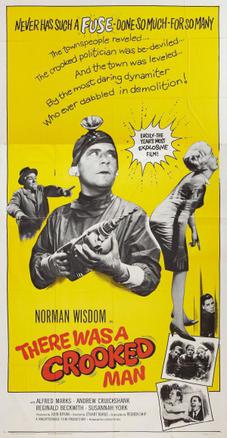| There Was a Crooked Man | |
|---|---|
 | |
| Directed by | Stuart Burge |
| Screenplay by | Reuben Ship |
| Based on | The Golden Legend of Shults 1939 play by James Bridie [1] |
| Produced by | John Bryan Albert Fennell |
| Starring | Norman Wisdom Alfred Marks Andrew Cruickshank |
| Cinematography | Arthur Ibbetson |
| Edited by | Peter R. Hunt |
| Music by | Kenneth V. Jones |
Production company | Knightsbridge Films |
| Distributed by | United Artists Corporation |
Release date |
|
Running time | 107 minutes |
| Country | United Kingdom |
| Language | English |
There Was a Crooked Man is a 1960 British comedy film directed by Stuart Burge and starring Norman Wisdom, Alfred Marks, Andrew Cruickshank, Reginald Beckwith and Susannah York. [2] It is based on the James Bridie play The Golden Legend of Schults. The film was one of two independent films (the other being The Girl on the Boat (1962)) in which Wisdom appeared in an effort to extend his range, as British audiences strongly identified him with his Gump character. [3] [4]
Contents
The film's title is taken from the English nursery rhyme "There Was a Crooked Man".